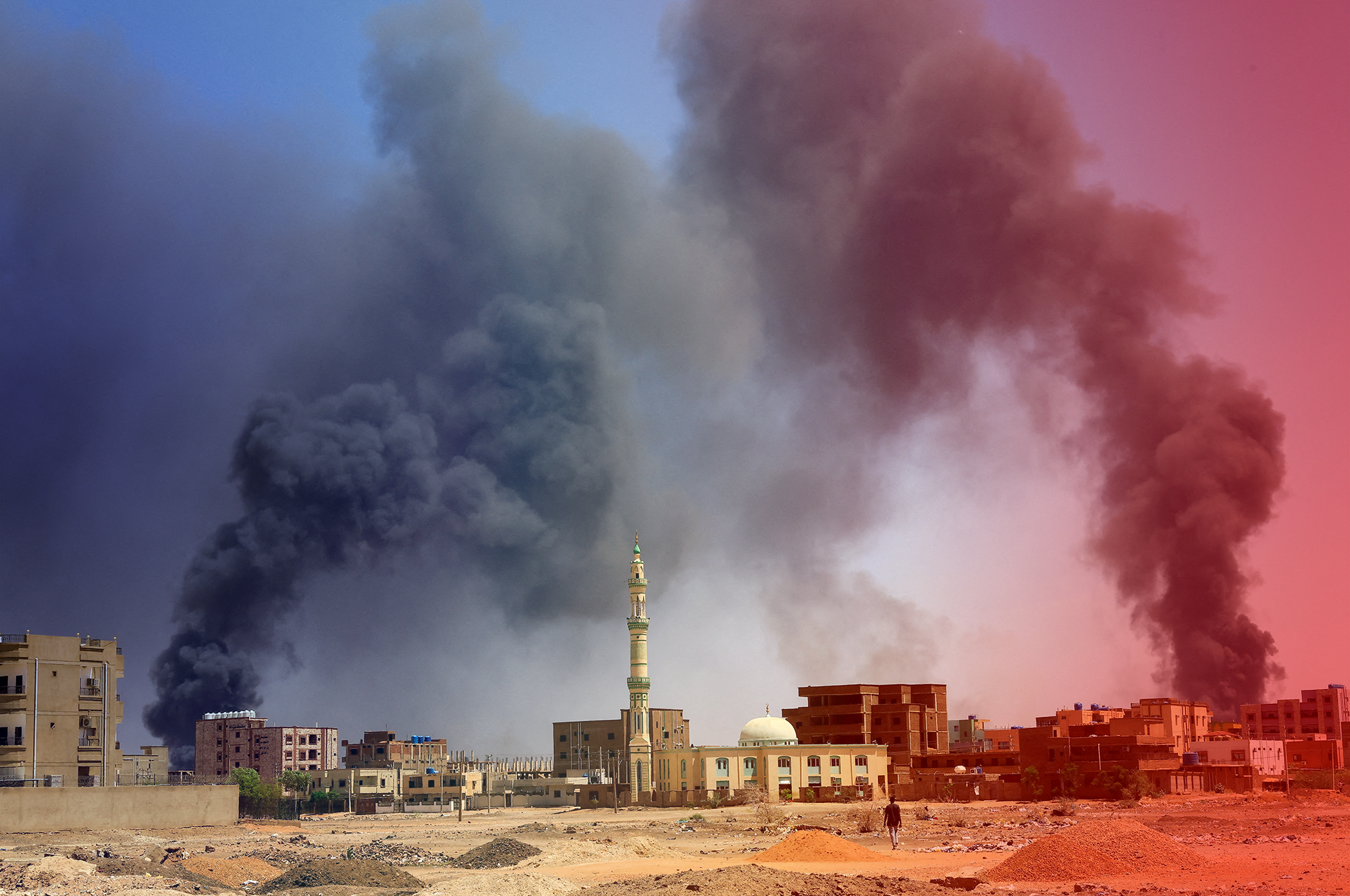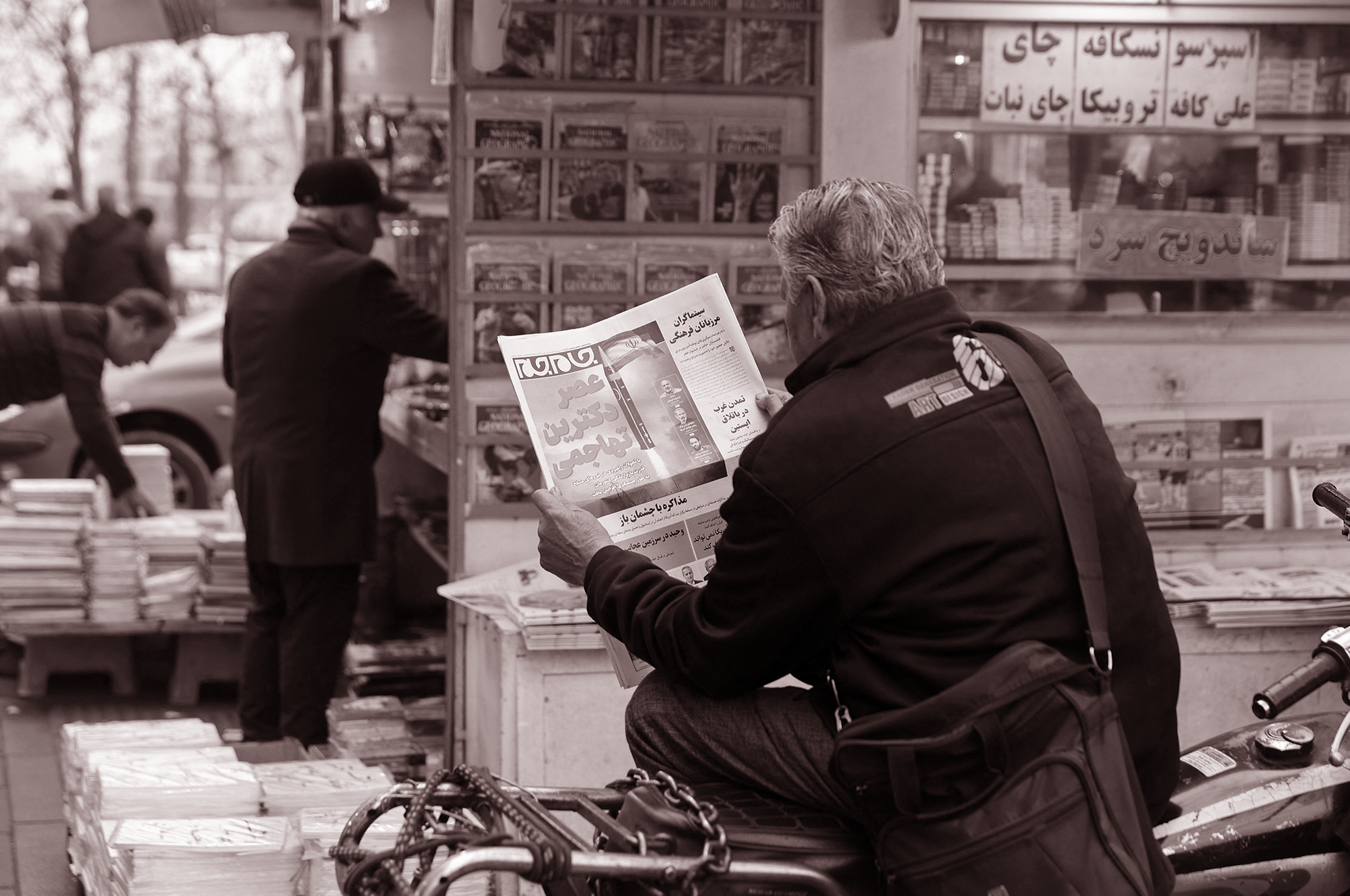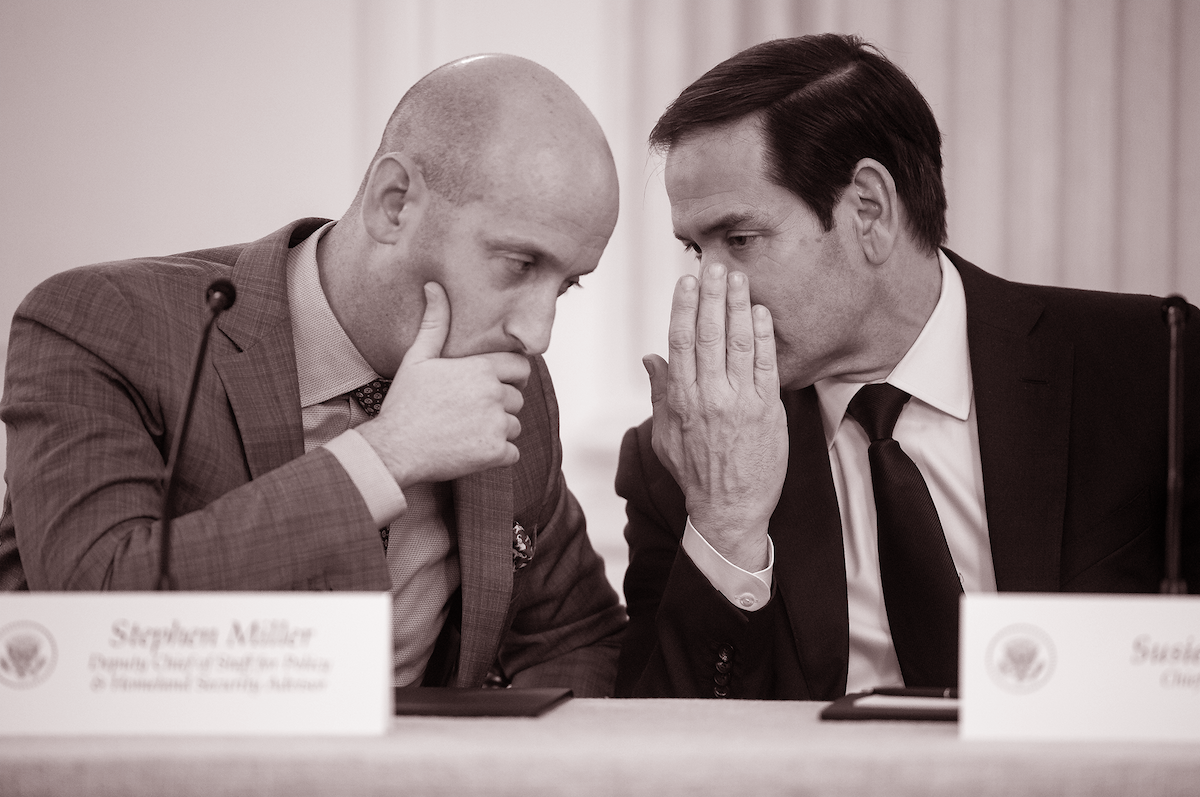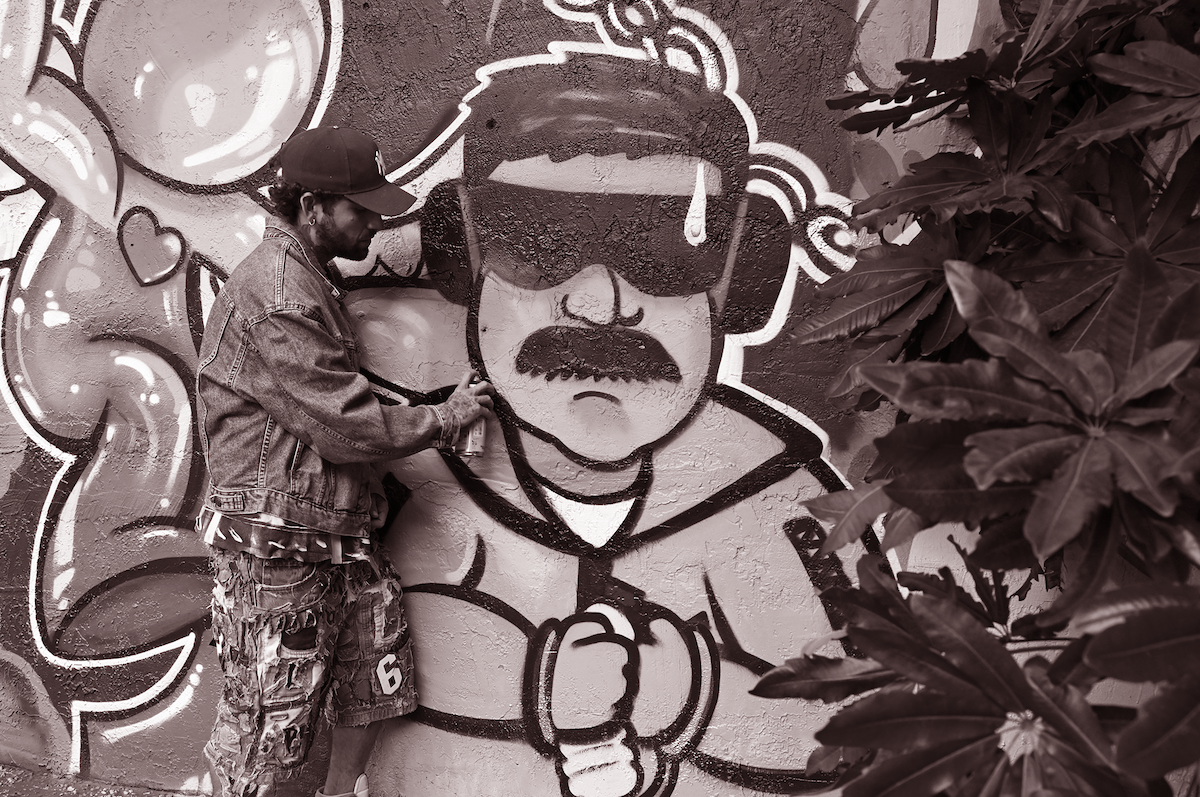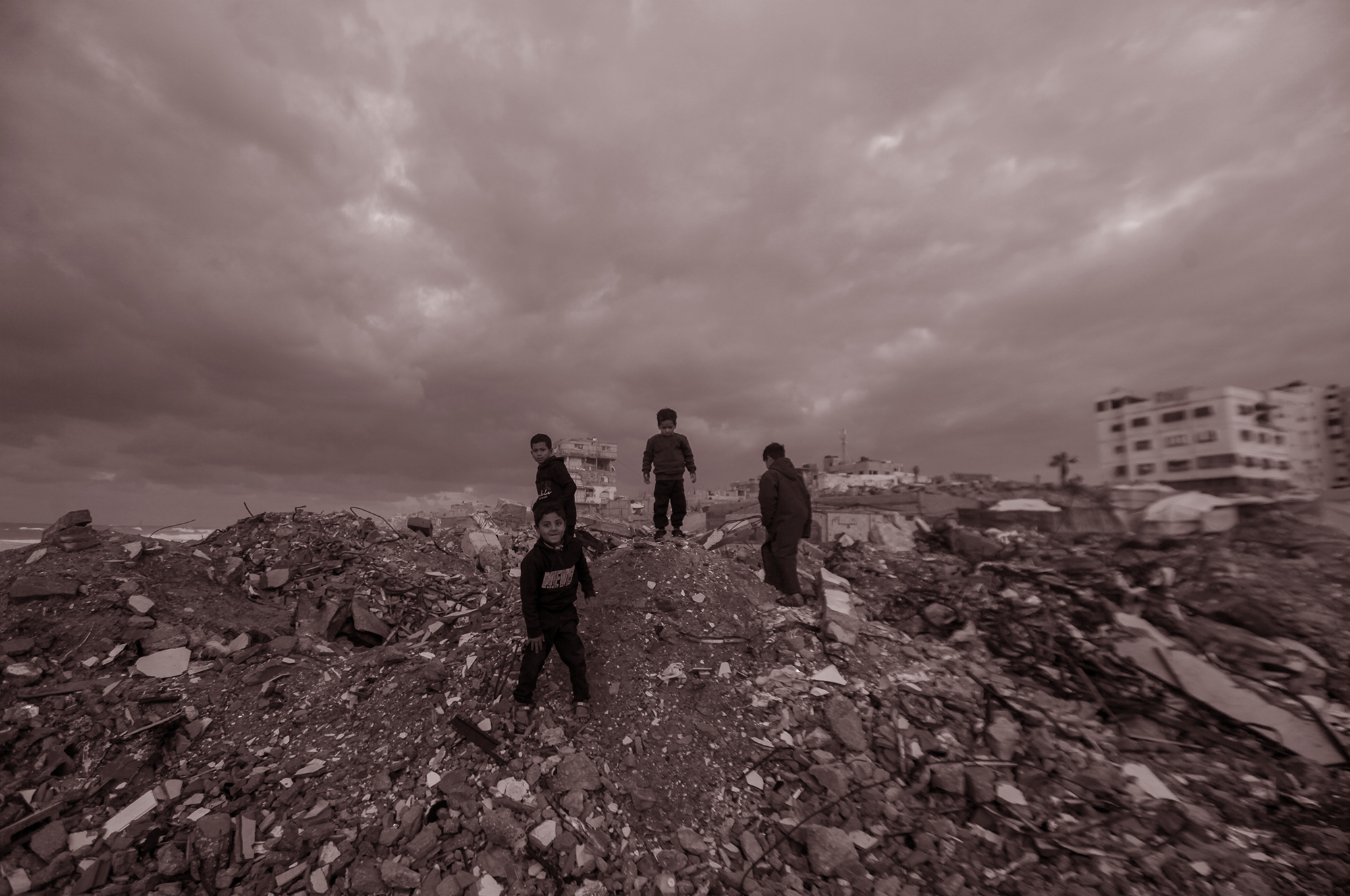Episode 16: Sudan and the Limits of Western Peacebuilding
On April 15, violence erupted across Sudan between the Sudanese Army, led by Gen. Abdel Fattah al-Burhan, and a paramilitary group called the Rapid Support Forces, led by Lt. Gen. Mohamed Hamdan–known also as Hemedti. As the warring factions compete for control of resource-rich Sudan, regional leaders like Egypt, Saudi Arabia, the UAE, Israel, as well as the United States and the United Nations are figuring out how to respond to help mitigate the catastrophic violence. But as this week’s guest reminds us, peacebuilding efforts from external actors like the U.S. and the UN, however well-intentioned, have unintended consequences. This week, guest host and EGF research fellow Zuri Linetsky speaks with Sudan expert Justin Lynch to help us make sense of the conflict playing out today and how attempts at peacebuilding and diplomacy by the West helped embolden the military leaders bringing the country to the brink of collapse.
Listen Here: Apple Podcasts | Google Play | Libsyn | Radio Public | Soundcloud | Spotify | Stitcher | TuneIn | RSS
Justin Lynch is a researcher and analyst living in Washington DC. He formerly worked as a reporter and United Nations official in Sudan. He is a co-author of Sudan’s Unfinished Democracy: The Promise and Betrayal of a People's Revolution.
This podcast episode includes references to the Eurasia Group Foundation, now known as the Institute for Global Affairs.
Show notes:
“How the U.N. and the West Failed Sudan” (Justin Lynch, Foreign Policy, May 2023)
”In Sudan, U.S. Policies Paved the Way for War” (Justin Lynch, Foreign Policy, April 2023)
Transcript:
JUSTIN LYNCH: You talk with diplomats. Nobody's surprised. Everybody saw this coming.
ZURI LINETSKY: Welcome to None of the Above, a podcast of the Eurasia Group Foundation. My name is Zuri Linetsky, and I'm stepping in for Mark Hannah today. This week, we turn to Sudan.
Interlude featuring archival audio
LINETSKY: Fighting continues to rage inside and outside of Khartoum, the Sudanese capital, despite warring factions agreeing to a ceasefire. Hundreds have been killed. Thousands have been wounded. And tens of thousands have been displaced since fighting began on April 15.
LYNCH: This had been brewing for, really, a couple of years. And we all saw the broad strokes of what was going to happen. But it was impossible to predict the exact date of when it was going to happen.
LINETSKY: That's Justin Lynch. He's a writer, researcher, an analyst on Sudan and a co-author of the book Sudan's Unfinished Democracy: The Promise and Betrayal of a People's Revolution.
LYNCH: So, how they got to today was that there had been months and years of tension between these two men over who was really going to lead Sudan. And that blew up on the 15th. And so, what we're seeing today in Sudan—it's just heartbreaking. It's just devastating. This is a capital city with seven million people, and right now there are bombardments happening in Khartoum. I have so many friends, so many contacts, so many colleagues who are trapped, and they don't know how to escape the city. They don't understand how to get to safety and how to flee. They don't have oil. They don't have water. They don't have food. They don't have an airport. It's very difficult. I think some people have made it out, but also, many people remain in Khartoum.
LINETSKY: Regional players like Egypt, the United Arab Emirates, and Israel, as well as the United States and United Nations, are trying to figure out how to stem the violence in Sudan. Last week, the U.S. helped broker a 72-hour ceasefire between the warring factions: the Sudanese army, led by General Abdel Fattah al-Berhan, and the Rapid Support Forces led by Lieutenant General Mohamed Hamdan, also known as Hemedti. The ceasefire followed what the State Department called “intense negotiations,” which allowed some people to evacuate the country safely. But the violence continues today.
Today's episode is about Sudan and external peacebuilding efforts in the country, particularly those led by the West, and how these efforts failed to prevent the violence and may have even pushed Sudan further away from peace. But first, some history.
LYNCH: In 1989, Omar al-Bashir was a mid-level general in the Sudanese armed forces, and he launched a military coup. And for the next 30 years, he ruled Sudan through corruption, through coercion. And he was a very savvy leader in the sense that he kept power in this very fragmented country, and he did that also by committing horrible human rights abuses. And so, I think when Bashir first started off, it's unclear how religious he was. But slowly throughout the ‘90s, you saw Bashir become more and more of an adherent to Islam. And by the mid-nineties, he had housed Osama bin Laden after bin Laden was kicked out of Saudi Arabia. And in 1997, the U.S. put sanctions on Sudan, which have really defined the U.S. and the international experience in Sudan since then.
LINETSKY: We'll come back to the United States’ relationship with Sudan in a second. But let's jump ahead in time a bit to understand the factors that contributed to Omar al-Bashir’s losing power—the division of Sudan and South Sudan in 2011.
LYNCH: What is present day South Sudan is where the oil is really located. And for the 20 years previously of Bashir’s rule, that's how he kind of kept everybody in check. That's how he paid everybody off. So, what happened is that when Bashir lost the oil, slowly his system of paying off people started to crumble because he couldn't afford it anymore. And so, that led to significant decreases in the daily wages.
Fast forward to 2018. The unions in Khartoum, the middle class, launched a protest movement to try and increase their minimum wage. And this was in September of 2018. Slowly, there were very small protests. And the goal at first wasn't to overthrow Omar al-Bashir; it was just to increase the minimum wage. But there was a series of events that took place in December, and slowly it became apparent to the leadership of this movement—which is called the Sudan Professionals Association, which is basically the collection of unions in Sudan. They decided in December 2018 to change the goal of their movement from increasing the minimum wage in Sudan to overthrowing Bashir. And that was critical because it really took away Bashir's key power base. If you think about it, a president or a dictator—they're not powerful just on their own. Their power comes in their ability to command other people to do things. And so, once Bashir lost that power to command his military, his system crumbled. Essentially and very critically, what happened is that Hemedti and the Sudanese armed forces—they combined together and said, “Our future is better off without Bashir.” And Bashir was removed.
LINETSKY: In theory, the plan for the transition was as follows: First, the military would stay in power for 21 months. Then, civilians would lead for the next 18 months. And finally, there would be democratic elections. But transitions aren't easy, and things don't always go to plan.
LYNCH: What happened—and I think this is so critical for folks to understand about revolutions at large—is that the Sudanese Professionals Association, this group of unions who organize the protests—they were your classic social movement that was similar to what you saw in Egypt during the Arab Spring, what you saw in Serbia with poor in the ‘90s and the 2000s. This was a social movement that had little leadership structure because that's the type of structure it takes to succeed in toppling a dictator. So, overnight they had to go from being a flat organization in their structure to being more hierarchical, and they partnered with other political opposition parties in Sudan, the Forces of Freedom and Change. And this was, I think, one of the key moments in the protest movement, because the FFC were not the ones who were really organizing a lot of the protests. It was the SPA. And the Forces of Freedom and Change had been the parties from the 1960s who had survived the dictatorship and were really allowed to operate. And so, they were not really efficient. They didn't have the real political backing that was ever going to have a popular support because they were allowed to exist because they were never a threat.
And so, the FFC and the SPA combined together just to start negotiating the way forward. And over a period of, I think, three or four months, you just saw how the civilians were totally outnumbered, outclassed, out-organized, and out-negotiated during this process by the military. It was so heartbreaking to see. I spent a lot of time with the SPA leaders during this period, and they knew their movement was slipping away. And really what happened is that the leadership of the SPA and the FFC had been co-opted. They were pressured by both the military and the international community to make a deal that, really, gave the military most of the power. And it was heartbreaking to watch because that is the roots of what we're seeing today. And so, in August, a transitional constitution was signed, and it allowed for the military to stay in power.
LINETSKY: While the military retained power, the transitional constitution also empowered civilian officials. And the key civilian player was Abdalla Hamdok. He was a U.N. economist, and he was tapped to step up as prime minister because he was a well-regarded expert and technocrat, but not a traditional Sudanese power broker.
LYNCH: You could tell very quickly that Hamdok was, really, one of the world's best analysts on Sudan but was going to struggle with being a politician. And I can't really blame him because that's a skill that takes years to really hone and develop, and he had to learn it overnight. I remember Hamdok viewed this transitional period. He would always tell me, “Justin, you know, revolutions go in cycles.” What we saw in 2019 was really the high point of a revolution, and what's going to come next is a low point. Hamdok knew his fate in that he knew he was going to be removed, and he was going to become unpopular. And he said, “Look, my job as prime minister is to try and make as many reforms as I can before the low point of this revolution comes and before the counter-revolution comes.” And in hindsight, we should have seen that when the economy was starting to increase, that would threaten the generals.
I remember the last time I saw Hamdok was in about June or July. And he was as upbeat as I'd ever seen him. The economy was improving. But I do remember we were talking about a specific reform that needed to be made. And Hamdok said, “Look, Justin, I don't have the authority to do this.” And he was asking the international community. He was asking foreign diplomats to bring up this particular issue with the Sudanese armed forces because he didn't have any power. And it was just so striking to me that Hamdok was asking diplomats to pressure the military, and he felt like he had no power to really carry out the necessary reforms that he needed to with the security forces.
LINETSKY: This is where the international community, and the West in particular, come back in.
LYNCH: What happened after the coup in 2021 was that the United Nations and the U.S. government really pushed a return to civilian rule because the policy was to try and support this transition. And it was so obvious that it was not going to work because it was a return to the 2019 agreement. And it was this kind of fantasy that would bring about civilian elections, where this was just repeating the same cycle. If you couldn't trust the generals previously, why would you do it again? One of the challenges with the U.S. government in Sudan is that they did not have an ambassador for I don't know how many years, but they only just recently put in an ambassador. And even other diplomats had so much more interaction with Sudanese. And yes, they lived in a bubble. We all lived in a bubble, obviously. But I think it was really striking with the U.S. And so, I think a lot of the staff there were really set up for, really, an impossible situation. And it's really a structural issue that speaks as much to the leadership of U.S. diplomacy and the structures of U.S. diplomacy rather than the individual staff who were on the ground.
LINETSKY: So, what do we need to know about the United States’ role in Sudan? And how does knowing that help us better understand what we're seeing today?
LYNCH: Starting in the ‘90s, Sudan and the U.S. have had a relationship that in many ways does not exist. Sudan was a pariah state from the international community because of Bashir's support of radical Islamists and people like Osama bin Laden. In addition, of course, there was the war in Darfur, which really sparked the attention of Americans, and there was the Save Darfur movement. And there is really a push to level as many sanctions and to punish Sudan and Omar al-Bashir as much as you can. But what you find, if you're a diplomat, is that you can only sanction so many people, and you can only do so much short of international intervention.
And so, by the late 2000s, when Obama first came into office, I think people will remember Obama for reopening relations with Cuba, trying to reopen relations with Iran. But really, Sudan was one of the first test cases of this to try and reach out to countries that it had this historical, antagonistic relationship with. But they found over a decade that it was never possible to essentially come together and overcome these political challenges. There were always attempts by U.S. diplomats to try and normalize relations, but because of U.S. politics and because of the many complications with Congress, they were never successful.
So, in 2019, once the revolution happened, this was like dreamland for the United States because it had opened the opportunity for a democracy in Sudan, which is something that many people had worked on—and many key people in U.S. foreign policy leadership: Susan Rice, Samantha Power, Denis McDonough. I should say—they were all very involved in Sudan and South Sudan's history. This was a moment in 2019 to bring democracy. I think 2019 and the policy after the overthrow of al-Bashir is really essential to understanding how we got to where we are today. I mentioned there was this protest movement that had led the overthrow of Bashir, and the U.S. and other nations tried to have them negotiate with the military for this transitional period. And it really took the wind out of the sails of this movement. I think—well, I know—what diplomats calculated is: “We need to have a transitional period, and this needs to be managed, because this situation could turn into Libya and Yemen.” And so, the U.S. and other countries said, “This has to be a transition. You can't ignore the military and that they exist.” And by the way, that could have been correct. That very well could have been the correct calculation and the most likely outcome for success. Of course, we'll never know.
LINETSKY: What's the alternative, though?
LYNCH: Well, the alternative would have been supporting the democratic movement by not putting pressure on them and putting pressure instead on the Sudanese armed forces.
LINETSKY: Can I just push you on that for just a second, Justin? What do you mean by supporting? And what do you mean by pressure? Not to not to interrogate you, but I want to be clear. The United States can play a role, a good role. It failed in Ethiopia, for example, to do much. That was more regional stuff. So, tell me what it could have done and why you have confidence in the United States, given what we've just seen in Ethiopia, it not being in the room?
LYNCH: Yeah. I think the influence the U.S. had during this period was as a key negotiator with both the Sudanese military and also the region—Saudi Arabia, the UAE, and Egypt as well. And there were a couple of critical meetings where the civilian leadership were brought on board with the fact that they have to negotiate with the military. And like I said, I don't want to be very critical. And I would like to be objective here because to be honest, that could have been the right move and the decision with the highest percentage of success—to say we need this transitional period, because there was a fear American diplomats had in 2019 that if we push too hard on the Sudanese military, they are going to react. And that could spark a civil war with the RSF as well—what we're really seeing today. So, it's difficult to, of course, try and game out a counterfactual.
LINETSKY: Right. I was reading the other day that I think they actually quietly threatened to impose sanctions on Hemedti. But yeah, targeting financial interests in the Persian Gulf. And that stands to reason, because the UAE were a big supporter and have been a historic supporter of Hemedti. Are you familiar with this? Why do you think it might not have happened? And if you're not, then I totally understand.
LYNCH: I have no idea what happens behind closed doors. In general, there are few countries that have faced as many individual sanctions as Sudan. And one of the challenges is that sanctions really lose their bite. I think the limitations of sanctions on the ground become apparent because the financial networks of both the SAF and the RSF—their money isn't held in their own name. It's held through intermediaries, through interlocutors. Money is often held in property. And so, the ability of the U.S. system to target both leaders with sanctions is limited also, like I said, because of the fact that Sudan was already cut off from the international financial system anyway. So, what are you going to sanction?
LINETSKY: This actually leads me to two more questions. The first has to do with the Abraham Accords. The Abraham Accords, which were a deal facilitated by the Trump administration for total normalization of ties between Israel and, initially, the United Arab Emirates, and then closely followed by Bahrain, Morocco, and Sudan. The big thing with Morocco and Sudan was that it was a transaction. For Morocco, the United States recognized its sovereignty over Western Sahara, which is a very contentious issue and continues to be. And for Sudan, they took it off the state sponsor of terrorism list. My question is: would the United States have had more influence to do the things that you're talking about—support the civilians and pressure the military—if it hadn't removed Sudan from this terror sponsor list?
LYNCH: Absolutely not. I think the U.S.—it was the U.S. objective to try and remove Sudan from the SST list as soon as possible. But because of Washington politics, it didn't happen. And that was a huge failure from the Trump administration. This was delayed for over a year. And during this year when the SST designation remained, this is when Hamdok needed a huge influx of cash. What Hamdok needed was cash and the ability to use that money in a way to garner him political power. And during that year, Hamdok believed the Americans and the international community—rightly or wrongly, Hamdok believed he had been promised certain things from the West, namely this financial support. And it didn't come. And so, I can't tell you… I've rarely seen Hamdok angry or frustrated. Probably the most frustrated I've ever seen him is when he was discussing the Abraham Accords with me because he felt like his country and his transition was held hostage for recognition of Israel. And what ultimately got the SST designation lifted from the U.S. and that ability to have that international financial support was the recognition of Israel, not…
LINETSKY: Anything that they did themselves.
LYNCH: Not democracy. And so, it was an extremely frustrating experience for Hamdok and, I think, as we look back, a key failure of the U.S.
LINETSKY: This is a great place to transition to my last set of questions. But it sounds like the failure of diplomacy at the international level, not only in South Sudan, but also again here, because globally, we rely on technocrats who in some cases just don't have the core diplomatic skills you need to navigate something as multifaceted as this crisis which involves, I don't know, as many as ten or twelve separate actors.
LYNCH: I don't know. I think that's a really good question and something I’ve thought about a lot. I think some of the folks in the U.S. government who are broadly working on Sudan are some of the smartest folks I know on this issue. And I remember speaking to some of them a couple of weeks ago, and I was asking them, “Why is U.S. policy to continue supporting this reconciliation agreement when we know what the outcome is going to be?”
And they said, “Look, Justin, you just have to kind of shut up in moments like this and go along with it,” because there were so many diplomats whom I know—everybody on the ground. The outcome was very obvious to those who were aware of their surroundings. Since the fighting, you talk with diplomats. Nobody's surprised. Everybody saw this coming, and they felt like they had to carry out orders from higher up that were made many levels above them. And it's really heartbreaking, because they were the ones who have to experience and have these memories of Khartoum and being evacuated and leaving behind staff who means so much to you and leaving behind Sudanese. It's not a fun experience for them or for anybody.
LINETSKY: As Justin reminds us, the inherent limits of external peacebuilding play a critical role in explaining the devastating fighting and violence we're seeing today in Sudan. As the United States responds with aid and assistance, I can't help but wonder about the mistakes it made in 2019 when it attempted to promote peace but instead helped embolden Sudan's military leaders. Perhaps the immediate lesson American policymakers should take from the current crisis is that sustained diplomatic engagement is vital for understanding, preventing, and when all else fails, mitigating civil conflict. But diplomacy has been deeply undervalued for some time now by the United States.
I’m Zuri Linetsky, and this has been another episode of None of the Above, a podcast of the Eurasia Group Foundation. I want to thank Justin Lynch for joining me. Special thanks also go out to our None of the Above team. Thanks to our producer, Caroline Gray, and our associate producer and editor, Sarah Leeson. If you enjoyed what you heard, we'd appreciate you subscribing on Apple Podcasts, Spotify, Stitcher, or anywhere else you find podcasts. Please rate and review us, and if there is a topic you want us to cover, send us an email at info@noneoftheabovepodcast.org. Thanks for joining us. Stay safe out there, and see you next time.
(END.)

